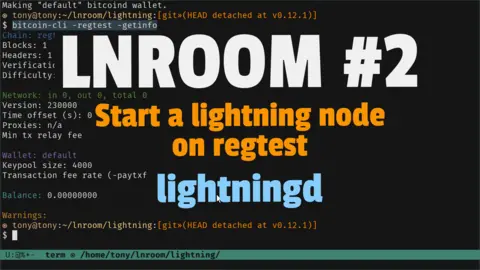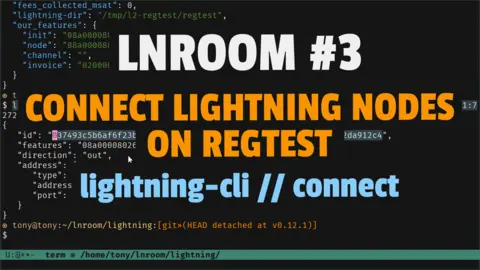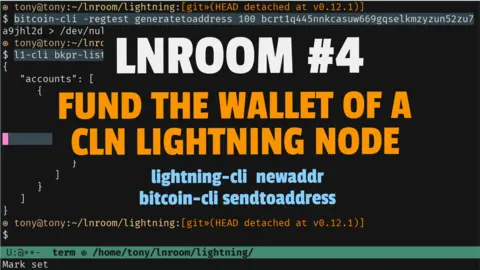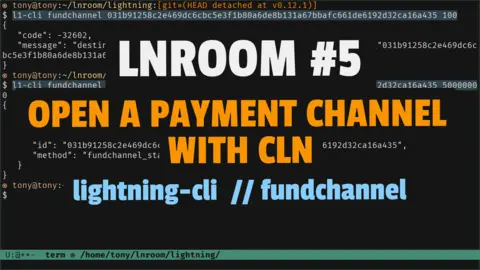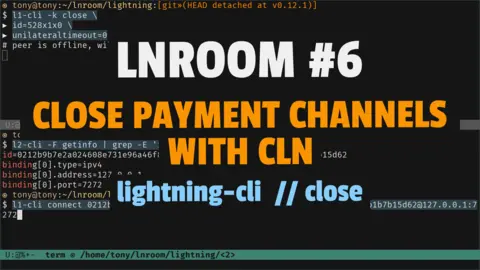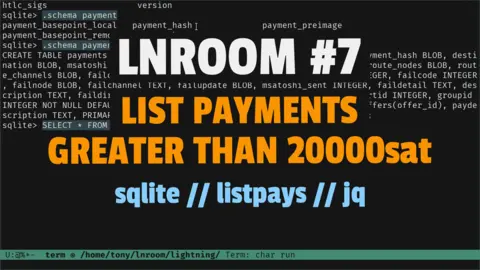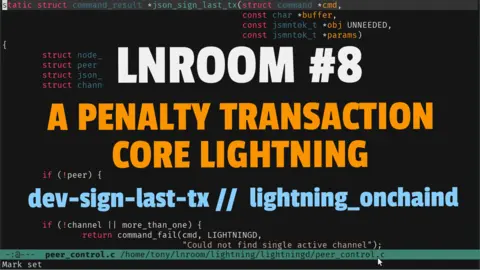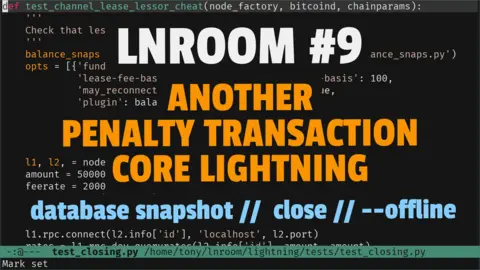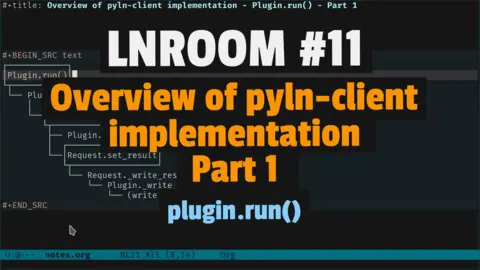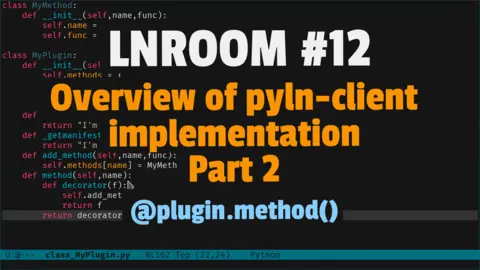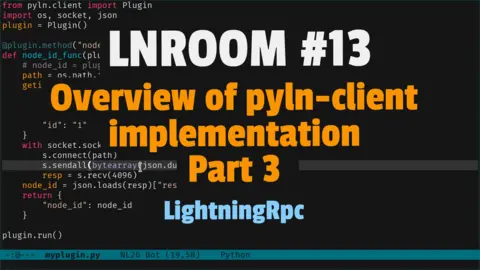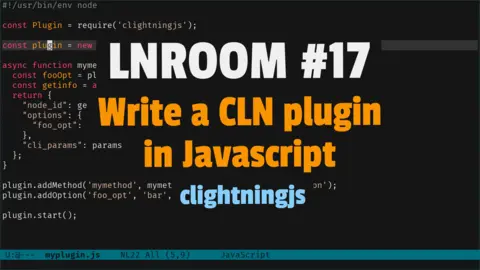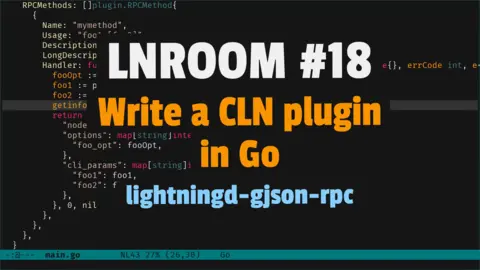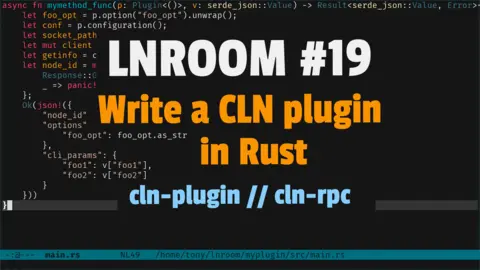Connect Lightning nodes on regtest with CLN
In this episode we connect two Lightning nodes running on regtest and we introduce the jq command, a JSON processor, by showing how we can use it to replace the combined use of grep, cut, tr and read to produce an id of the form id@host:port that we pass as argument of the sub-command connect of lightning-cli.
Transcript with corrections and improvements
Hi guys, welcome to the LN Room, I'm Tony Aldon and today in this
episode 3 we are going to connect two Lightning nodes running on
regtest using CLN.
Before we start, let's set up the plan for this episode:
we start two Lightning nodes running on
regtestand we connect them,we introduce the
jqcommand, a JSON processor, by showing how we can use it to replace the combined use ofgrep,cut,trandreadto produce anidof the formid@host:portthat we pass as argument of the sub-commandconnectoflightning-cli.
Let's get started.
Start two Lightning nodes running on regtest
We are in the terminal, in the lightning repository, we source the
script contrib/startup_regtest.sh that we have already used in the
previous episodes. This script provides commands and aliases to
startup local nodes with bitcoind all running on regtest. This is
useful to test things out, by hand:
◉ tony@tony:~/lnroom/lightning:[git»(HEAD detached at v0.12.1)]
$ source contrib/startup_regtest.sh
lightning-cli is /usr/bin/lightning-cli
lightningd is /usr/bin/lightningdFirst we start two nodes running on regtest by running the following command:
◉ tony@tony:~/lnroom/lightning:[git»(HEAD detached at v0.12.1)]
$ start_ln 2
Bitcoin Core starting
awaiting bitcoind...
Making "default" bitcoind wallet.
[1] 25354
[2] 25388
Commands:
l1-cli, l1-log,
l2-cli, l2-log,
bt-cli, stop_ln, fund_nodesWe see that Bitcoin Core has been started with one wallet called
default and we now have access to new commands.
For instance bt-cli is an alias for bitcoin-cli -regtest that we can
use to check that we are indeed running bitcoind on regtest:
◉ tony@tony:~/lnroom/lightning:[git»(HEAD detached at v0.12.1)]
$ bt-cli -getinfo
Chain: regtest
Blocks: 1
Headers: 1
Verification progress: 100.0000%
Difficulty: 4.656542373906925e-10
Network: in 0, out 0, total 0
Version: 230000
Time offset (s): 0
Proxies: n/a
Min tx relay fee rate (BTC/kvB): 0.00001000
Wallet: default
Keypool size: 4000
Transaction fee rate (-paytxfee) (BTC/kvB): 0.00000000
Balance: 0.00000000
Warnings:We can see that the default wallet has no coins in its balance.
And since the Lightning nodes don't need to be funded to connect to
each other we won't mine any blocks and the balance of the default
wallet will remain zero.
To avoid using the l1-cli and l2-cli aliases blindly, let's print out
what they are:
◉ tony@tony:~/lnroom/lightning:[git»(HEAD detached at v0.12.1)]
$ alias | grep 'l[12]'
alias l1-cli='lightning-cli --lightning-dir=/tmp/l1-regtest'
alias l1-log='less /tmp/l1-regtest/log'
alias l2-cli='lightning-cli --lightning-dir=/tmp/l2-regtest'
alias l2-log='less /tmp/l2-regtest/log'So far we just checked that the command startup_ln started bitcoind.
By running the following command we can also checked that two
instances of lightningd have been started, one with the base directory
/tmp/l1-regtest/ and the other with /tmp/l2-regtest/:
◉ tony@tony:~/lnroom/lightning:[git»(HEAD detached at v0.12.1)]
$ ps -ax | grep lightningd
25357 pts/1 S 0:00 lightningd --lightning-dir=/tmp/l1-regtest
25390 pts/1 S 0:00 lightningd --lightning-dir=/tmp/l2-regtest
27326 pts/1 S+ 0:00 grep --color=auto lightningdConnect the node l1 to the node l2
To connect two nodes, CLN provides the sub-command connect.
We can read in its man page that to connect the node l1 to the node l2
we can passe the argument id@host:port to the command line l1-cli
connect where id is the public key of the node l2:
◉ tony@tony:~/lnroom/lightning:[git»(HEAD detached at v0.12.1)]
$ l1-cli help connect
LIGHTNING-CONNECT(7) LIGHTNING-CONNECT(7)
NAME
lightning-connect -- Command for connecting to another lightning node
SYNOPSIS
connect id [host] [port]
DESCRIPTION
The connect RPC command establishes a new connection with another node in the Light-
ning Network.
id represents the target node's public key. As a convenience, id may be of the form
id@host or id@host:port. In this case, the host and port parameters must be omitted.
host is the peer's hostname or IP address.
If not specified, the port depends on the current network: - bitcoin mainnet: 9735.
- bitcoin testnet: 19735. - bitcoin signet: 39735. - bitcoin regtest: 19846.
If host is not specified (or doesn't work), the connection will be attempted to an IP
belonging to id obtained through gossip with other already connected peers. This can
fail if your C-lightning node is a fresh install that has not connected to any peersWe get those information using the sub-command getinfo, looking at the
attribute id and the attributes address and port of the first object
in the array binding in the output produced:
◉ tony@tony:~/lnroom/lightning:[git»(HEAD detached at v0.12.1)]
$ l2-cli getinfo
{
"id": "037493c5b6af6f23bed9d5f5d3d3583c47941bc20ef6c019a21e47d5992da912c4",
"alias": "UNITEDTOTE",
"color": "037493",
"num_peers": 0,
"num_pending_channels": 0,
"num_active_channels": 0,
"num_inactive_channels": 0,
"address": [],
"binding": [
{
"type": "ipv4",
"address": "127.0.0.1",
"port": 7272
}
],
"version": "0.12.1",
"blockheight": 1,
"network": "regtest",
"fees_collected_msat": 0,
"lightning-dir": "/tmp/l2-regtest/regtest",
"our_features": {
"init": "08a000080269a2",
"node": "88a000080269a2",
"channel": "",
"invoice": "02000000024100"
}
}Then we can construct the argument id@host:port for the node l2 and
connect the nodes by running the following command:
◉ tony@tony:~/lnroom/lightning:[git»(HEAD detached at v0.12.1)]
$ l1-cli connect 037493c5b6af6f23bed9d5f5d3d3583c47941bc20ef6c019a21e47d5992da912c4@127.0.0.1:7272
{
"id": "037493c5b6af6f23bed9d5f5d3d3583c47941bc20ef6c019a21e47d5992da912c4",
"features": "08a000080269a2",
"direction": "out",
"address": {
"type": "ipv4",
"address": "127.0.0.1",
"port": 7272
}
}In the object returned the value 08a000080269a2 of the features
attribute is the BOLT 9 features bitmap offered by the peer (node l2),
and the out in the attribute direction signals that we (the node l1)
initiated the connection.
To check that we the nodes l1 and l2 are connected we can use the
sub-command listpeers either from the perspective of l1 or l2 as
follow:
◉ tony@tony:~/lnroom/lightning:[git»(HEAD detached at v0.12.1)]
$ l1-cli listpeers
{
"peers": [
{
"id": "037493c5b6af6f23bed9d5f5d3d3583c47941bc20ef6c019a21e47d5992da912c4",
"connected": true,
"netaddr": [
"127.0.0.1:7272"
],
"features": "08a000080269a2",
"channels": []
}
]
}
◉ tony@tony:~/lnroom/lightning:[git»(HEAD detached at v0.12.1)]
$ l2-cli listpeers
{
"peers": [
{
"id": "02695a3a6ae6ff038407f4bdebe82d7ac7a31d7edab1c4dbaa885e1aa2ba9bacc2",
"connected": true,
"netaddr": [
"127.0.0.1:45348"
],
"features": "08a000080269a2",
"channels": []
}
]
}Disconnect the nodes l1 and l2
The last thing we can do before we move on to the next part about jq
utility, we can disconnect the nodes l1 and l2 with the sub-command
disconnect.
As we can read in its man page, we just have to pass the id of the
node l2 to the command l1-cli disconnect to disconnect since the node
l1 doesn't have an active channel with the node l2:
◉ tony@tony:~/lnroom/lightning:[git»(HEAD detached at v0.12.1)]
$ l1-cli help disconnect
LIGHTNING-DISCONNECT(7) LIGHTNING-DISCONNECT(7)
NAME
lightning-disconnect -- Command for disconnecting from another lightning node
SYNOPSIS
disconnect id [force]
DESCRIPTION
The disconnect RPC command closes an existing connection to a peer, identified by id,
in the Lightning Network, as long as it doesn't have an active channel. If force is
set then it will disconnect even with an active channel.
The id can be discovered in the output of the listpeers command, which returns a set
of peers:
{
"peers": [
{
"id": "0563aea81...",
"connected": true,
...
}We get the id of the node l2 using jq:
◉ tony@tony:~/lnroom/lightning:[git»(HEAD detached at v0.12.1)]
$ l2-cli getinfo | jq .id
"037493c5b6af6f23bed9d5f5d3d3583c47941bc20ef6c019a21e47d5992da912c4"and disconnect the two nodes by running the following command:
◉ tony@tony:~/lnroom/lightning:[git»(HEAD detached at v0.12.1)]
$ l1-cli disconnect 037493c5b6af6f23bed9d5f5d3d3583c47941bc20ef6c019a21e47d5992da912c4
{}The two nodes have been disconnected and we can check this out by listing the peers of both nodes like this:
◉ tony@tony:~/lnroom/lightning:[git»(HEAD detached at v0.12.1)]
$ l2-cli listpeers
{
"peers": []
}
◉ tony@tony:~/lnroom/lightning:[git»(HEAD detached at v0.12.1)]
$ l1-cli listpeers
{
"peers": []
}We are done with the first part of this video.
Introduction to jq and the command connect in contrib/startup_regtest.sh
In this second part we introduce jq utility and see how we can use it
to reproduce one of the command line used in the command connect
provided in the script contrib/startup_regtest.sh.
Here is the command connect:
connect() {
if [ -z "$1" ] || [ -z "$2" ]; then
printf "usage: connect 1 2\n"
else
to=$($LCLI --lightning-dir="/tmp/l$2-$network" -F getinfo \
| grep '^\(id\|binding\[0\]\.\(address\|port\)\)' \
| cut -d= -f2- \
| tr '\n' ' ' \
| (read -r ID ADDR PORT; echo "$ID@${ADDR}:$PORT"))
$LCLI --lightning-dir="/tmp/l$1-$network" connect "$to"
fi
}Using it in the terminal like this:
◉ tony@tony:~/lnroom/lightning:[git»(HEAD detached at v0.12.1)]
$ connect 1 2has the same effect (connecting the node l1 and l2) as we did before
when we ran this command:
◉ tony@tony:~/lnroom/lightning:[git»(HEAD detached at v0.12.1)]
$ l1-cli connect 037493c5b6af6f23bed9d5f5d3d3583c47941bc20ef6c019a21e47d5992da912c4@127.0.0.1:7272The part in connect we want to play with is to=$(...).
In our case, the variable $LCLI is equal to lightning-cli , $network
to regtest and in the call connect 1 2 the variable $2 is 'equal' to
2, so the command line
$LCLI --lightning-dir="/tmp/l$2-$network" -F getinfois 'equal' to
lightning-cli --lightning-dir="/tmp/l2-regtest/" -F getinfoand if we use our alias l2-cli, this command is 'equal' to:
l2-cli -F getinfoThe -F (or --flat) flag returns the JSON result in a one-per-line
output as we can see in the following snippet for the node l1:
◉ tony@tony:~/lnroom/lightning:[git»(HEAD detached at v0.12.1)]
$ l1-cli getinfo -F
id=02695a3a6ae6ff038407f4bdebe82d7ac7a31d7edab1c4dbaa885e1aa2ba9bacc2
alias=SLEEPYFEED
color=02695a
num_peers=0
num_pending_channels=0
num_active_channels=0
num_inactive_channels=0
binding[0].type=ipv4
binding[0].address=127.0.0.1
binding[0].port=7171
version=0.12.1
blockheight=1
network=regtest
fees_collected_msat=0
lightning-dir=/tmp/l1-regtest/regtest
our_features.init=08a000080269a2
our_features.node=88a000080269a2
our_features.channel=
our_features.invoice=02000000024100We can compare that flatten output with the JSON object in the following snippet:
◉ tony@tony:~/lnroom/lightning:[git»(HEAD detached at v0.12.1)]
$ l1-cli getinfo
{
"id": "02695a3a6ae6ff038407f4bdebe82d7ac7a31d7edab1c4dbaa885e1aa2ba9bacc2",
"alias": "SLEEPYFEED",
"color": "02695a",
"num_peers": 0,
"num_pending_channels": 0,
"num_active_channels": 0,
"num_inactive_channels": 0,
"address": [],
"binding": [
{
"type": "ipv4",
"address": "127.0.0.1",
"port": 7171
}
],
"version": "0.12.1",
"blockheight": 1,
"network": "regtest",
"fees_collected_msat": 0,
"lightning-dir": "/tmp/l1-regtest/regtest",
"our_features": {
"init": "08a000080269a2",
"node": "88a000080269a2",
"channel": "",
"invoice": "02000000024100"
}
}The use of the -F flag is convenient when we want to pipe the output
to existing Unix utilities, which are well suited for line
processing like grep and that use with field delimiter like cut.
For instance, the grep part in the line to=$(...) to the previous
flatten output allows to keep only the information id, address and
port of a node. We can see it for the node l1 by running the
following command:
◉ tony@tony:~/lnroom/lightning:[git»(HEAD detached at v0.12.1)]
$ l1-cli getinfo -F | grep '^\(id\|binding\[0\]\.\(address\|port\)\)'
id=02695a3a6ae6ff038407f4bdebe82d7ac7a31d7edab1c4dbaa885e1aa2ba9bacc2
binding[0].address=127.0.0.1
binding[0].port=7171The rest of the line in to=$(...) uses cut, tr, read and echo to
produce an output of the form id@host:port that is bound to the
variable to.
Let's see how we can do this for the node l2 only using jq:
We can get the id of the node l2 using the filter .id and with the
flag -r (or --raw-output) in the case of a string the output is not
formatted as JSON string and the double quote are removed from the
output:
◉ tony@tony:~/lnroom/lightning:[git»(HEAD detached at v0.12.1)]
$ l2-cli getinfo | jq .id
"037493c5b6af6f23bed9d5f5d3d3583c47941bc20ef6c019a21e47d5992da912c4"
◉ tony@tony:~/lnroom/lightning:[git»(HEAD detached at v0.12.1)]
$ l2-cli getinfo | jq .id -r
037493c5b6af6f23bed9d5f5d3d3583c47941bc20ef6c019a21e47d5992da912c4We can get the the address (i.e., the host) defined in the first
object of the array binding with the filter .binding[0].address like
this:
◉ tony@tony:~/lnroom/lightning:[git»(HEAD detached at v0.12.1)]
$ l2-cli getinfo | jq .binding[0].address
"127.0.0.1"In the same vein we can get the port of the node l2 like this:
◉ tony@tony:~/lnroom/lightning:[git»(HEAD detached at v0.12.1)]
$ l2-cli getinfo | jq .binding[0].port
7272Pay attention to the previous output which is not surrounded by double
quote which means that 7272 is a number in jq program. As jq doesn't
do implicit cast, we can convert it to a string by passing the output
of the filter .binding[0].port to the operator tostring using the pipe
| operator like this:
◉ tony@tony:~/lnroom/lightning:[git»(HEAD detached at v0.12.1)]
$ l2-cli getinfo | jq '.binding[0].port | tostring'
"7272"jq provides the operator + that in the case of two strings join them
into a larger string as we can see in the following command where we
add @ character to the node's id:
◉ tony@tony:~/lnroom/lightning:[git»(HEAD detached at v0.12.1)]
$ l2-cli getinfo | jq '.id + "@"'
"037493c5b6af6f23bed9d5f5d3d3583c47941bc20ef6c019a21e47d5992da912c4@"Now, if we put together all we've seen about jq so far we can produce
an output of the form id@host:port for the node l2 like this:
◉ tony@tony:~/lnroom/lightning:[git»(HEAD detached at v0.12.1)]
$ l2-cli getinfo | jq '.id + "@" + .binding[0].address + ":" + (.binding[0].port | tostring)'
"037493c5b6af6f23bed9d5f5d3d3583c47941bc20ef6c019a21e47d5992da912c4@127.0.0.1:7272"We can now connect the node l1 to the node l2 like this:
◉ tony@tony:~/lnroom/lightning:[git»(HEAD detached at v0.12.1)]
$ l1-cli connect 037493c5b6af6f23bed9d5f5d3d3583c47941bc20ef6c019a21e47d5992da912c4@127.0.0.1:7
272
{
"id": "037493c5b6af6f23bed9d5f5d3d3583c47941bc20ef6c019a21e47d5992da912c4",
"features": "08a000080269a2",
"direction": "out",
"address": {
"type": "ipv4",
"address": "127.0.0.1",
"port": 7272
}
}This is what I wanted to do with you in the last part.
jq is an amazing tool that you might want to integrate in your
toolkit. Its man page is incredible. Taking 5 to 6 hours to read the
man page and try things will pay off in the short and long term. Give
it a try.
That's all I have to share with you today.
I hope you get some value from this video.
See you next time in the next episode of LN Room.
Terminal session
We ran the following commands in this order:
$ source contrib/startup_regtest.sh
$ start_ln 2
$ bt-cli -getinfo
$ alias | grep 'l[12]'
$ ps -ax | grep lightningd
$ l1-cli help connect
$ l2-cli getinfo | jq
$ l1-cli connect 037493c5b6af6f23bed9d5f5d3d3583c47941bc20ef6c019a21e47d5992da912c4@127.0.0.1:7272
$ l1-cli listpeers
$ l2-cli listpeers
$ l1-cli help disconnect
$ l2-cli getinfo | jq .id
$ l1-cli disconnect 037493c5b6af6f23bed9d5f5d3d3583c47941bc20ef6c019a21e47d5992da912c4
$ l2-cli listpeers
$ l1-cli listpeers
$ l1-cli getinfo
$ l1-cli getinfo -F
$ l1-cli getinfo -F | grep '^\(id\|binding\[0\]\.\(address\|port\)\)'
$ l2-cli getinfo | jq .id
$ l2-cli getinfo | jq .id -r
$ l2-cli getinfo | jq .binding[0].address
$ l2-cli getinfo | jq .binding[0].port
$ l2-cli getinfo | jq '.binding[0].port | tostring'
$ l2-cli getinfo | jq '.id + "@"'
$ l2-cli getinfo | jq '.id + "@" + .binding[0].address + ":" + (.binding[0].port | tostring)'
$ l1-cli connect 037493c5b6af6f23bed9d5f5d3d3583c47941bc20ef6c019a21e47d5992da912c4@127.0.0.1:7And below you can read the terminal session (command lines and outputs):
◉ tony@tony:~/lnroom/lightning:[git»(HEAD detached at v0.12.1)]
$ source contrib/startup_regtest.sh
lightning-cli is /usr/bin/lightning-cli
lightningd is /usr/bin/lightningd
◉ tony@tony:~/lnroom/lightning:[git»(HEAD detached at v0.12.1)]
$ start_ln 2
Bitcoin Core starting
awaiting bitcoind...
Making "default" bitcoind wallet.
[1] 25354
[2] 25388
Commands:
l1-cli, l1-log,
l2-cli, l2-log,
bt-cli, stop_ln, fund_nodes
◉ tony@tony:~/lnroom/lightning:[git»(HEAD detached at v0.12.1)]
$ bt-cli -getinfo
Chain: regtest
Blocks: 1
Headers: 1
Verification progress: 100.0000%
Difficulty: 4.656542373906925e-10
Network: in 0, out 0, total 0
Version: 230000
Time offset (s): 0
Proxies: n/a
Min tx relay fee rate (BTC/kvB): 0.00001000
Wallet: default
Keypool size: 4000
Transaction fee rate (-paytxfee) (BTC/kvB): 0.00000000
Balance: 0.00000000
Warnings:
◉ tony@tony:~/lnroom/lightning:[git»(HEAD detached at v0.12.1)]
$ alias | grep 'l[12]'
alias l1-cli='lightning-cli --lightning-dir=/tmp/l1-regtest'
alias l1-log='less /tmp/l1-regtest/log'
alias l2-cli='lightning-cli --lightning-dir=/tmp/l2-regtest'
alias l2-log='less /tmp/l2-regtest/log'
◉ tony@tony:~/lnroom/lightning:[git»(HEAD detached at v0.12.1)]
$ ps -ax | grep lightningd
25357 pts/1 S 0:00 lightningd --lightning-dir=/tmp/l1-regtest
25390 pts/1 S 0:00 lightningd --lightning-dir=/tmp/l2-regtest
27326 pts/1 S+ 0:00 grep --color=auto lightningd
◉ tony@tony:~/lnroom/lightning:[git»(HEAD detached at v0.12.1)]
$ l1-cli help connect
LIGHTNING-CONNECT(7) LIGHTNING-CONNECT(7)
NAME
lightning-connect -- Command for connecting to another lightning node
SYNOPSIS
connect id [host] [port]
DESCRIPTION
The connect RPC command establishes a new connection with another node in the Light-
ning Network.
id represents the target node's public key. As a convenience, id may be of the form
id@host or id@host:port. In this case, the host and port parameters must be omitted.
host is the peer's hostname or IP address.
If not specified, the port depends on the current network: - bitcoin mainnet: 9735.
- bitcoin testnet: 19735. - bitcoin signet: 39735. - bitcoin regtest: 19846.
If host is not specified (or doesn't work), the connection will be attempted to an IP
belonging to id obtained through gossip with other already connected peers. This can
fail if your C-lightning node is a fresh install that has not connected to any peers
◉ tony@tony:~/lnroom/lightning:[git»(HEAD detached at v0.12.1)]
$ l2-cli getinfo | jq
{
"id": "037493c5b6af6f23bed9d5f5d3d3583c47941bc20ef6c019a21e47d5992da912c4",
"alias": "UNITEDTOTE",
"color": "037493",
"num_peers": 0,
"num_pending_channels": 0,
"num_active_channels": 0,
"num_inactive_channels": 0,
"address": [],
"binding": [
{
"type": "ipv4",
"address": "127.0.0.1",
"port": 7272
}
],
"version": "0.12.1",
"blockheight": 1,
"network": "regtest",
"fees_collected_msat": 0,
"lightning-dir": "/tmp/l2-regtest/regtest",
"our_features": {
"init": "08a000080269a2",
"node": "88a000080269a2",
"channel": "",
"invoice": "02000000024100"
}
}
◉ tony@tony:~/lnroom/lightning:[git»(HEAD detached at v0.12.1)]
$ l1-cli connect 037493c5b6af6f23bed9d5f5d3d3583c47941bc20ef6c019a21e47d5992da912c4@127.0.0.1:7272
{
"id": "037493c5b6af6f23bed9d5f5d3d3583c47941bc20ef6c019a21e47d5992da912c4",
"features": "08a000080269a2",
"direction": "out",
"address": {
"type": "ipv4",
"address": "127.0.0.1",
"port": 7272
}
}
◉ tony@tony:~/lnroom/lightning:[git»(HEAD detached at v0.12.1)]
$ l1-cli listpeers
{
"peers": [
{
"id": "037493c5b6af6f23bed9d5f5d3d3583c47941bc20ef6c019a21e47d5992da912c4",
"connected": true,
"netaddr": [
"127.0.0.1:7272"
],
"features": "08a000080269a2",
"channels": []
}
]
}
◉ tony@tony:~/lnroom/lightning:[git»(HEAD detached at v0.12.1)]
$ l2-cli listpeers
{
"peers": [
{
"id": "02695a3a6ae6ff038407f4bdebe82d7ac7a31d7edab1c4dbaa885e1aa2ba9bacc2",
"connected": true,
"netaddr": [
"127.0.0.1:45348"
],
"features": "08a000080269a2",
"channels": []
}
]
}
◉ tony@tony:~/lnroom/lightning:[git»(HEAD detached at v0.12.1)]
$ l1-cli help disconnect
LIGHTNING-DISCONNECT(7) LIGHTNING-DISCONNECT(7)
NAME
lightning-disconnect -- Command for disconnecting from another lightning node
SYNOPSIS
disconnect id [force]
DESCRIPTION
The disconnect RPC command closes an existing connection to a peer, identified by id,
in the Lightning Network, as long as it doesn't have an active channel. If force is
set then it will disconnect even with an active channel.
The id can be discovered in the output of the listpeers command, which returns a set
of peers:
{
"peers": [
{
"id": "0563aea81...",
"connected": true,
...
}
◉ tony@tony:~/lnroom/lightning:[git»(HEAD detached at v0.12.1)]
$ l2-cli getinfo | jq .id
"037493c5b6af6f23bed9d5f5d3d3583c47941bc20ef6c019a21e47d5992da912c4"
◉ tony@tony:~/lnroom/lightning:[git»(HEAD detached at v0.12.1)]
$ l1-cli disconnect 037493c5b6af6f23bed9d5f5d3d3583c47941bc20ef6c019a21e47d5992da912c4
{}
◉ tony@tony:~/lnroom/lightning:[git»(HEAD detached at v0.12.1)]
$ l2-cli listpeers
{
"peers": []
}
◉ tony@tony:~/lnroom/lightning:[git»(HEAD detached at v0.12.1)]
$ l1-cli listpeers
{
"peers": []
}
◉ tony@tony:~/lnroom/lightning:[git»(HEAD detached at v0.12.1)]
$ l1-cli getinfo
{
"id": "02695a3a6ae6ff038407f4bdebe82d7ac7a31d7edab1c4dbaa885e1aa2ba9bacc2",
"alias": "SLEEPYFEED",
"color": "02695a",
"num_peers": 0,
"num_pending_channels": 0,
"num_active_channels": 0,
"num_inactive_channels": 0,
"address": [],
"binding": [
{
"type": "ipv4",
"address": "127.0.0.1",
"port": 7171
}
],
"version": "0.12.1",
"blockheight": 1,
"network": "regtest",
"fees_collected_msat": 0,
"lightning-dir": "/tmp/l1-regtest/regtest",
"our_features": {
"init": "08a000080269a2",
"node": "88a000080269a2",
"channel": "",
"invoice": "02000000024100"
}
}
◉ tony@tony:~/lnroom/lightning:[git»(HEAD detached at v0.12.1)]
$ l1-cli getinfo -F
id=02695a3a6ae6ff038407f4bdebe82d7ac7a31d7edab1c4dbaa885e1aa2ba9bacc2
alias=SLEEPYFEED
color=02695a
num_peers=0
num_pending_channels=0
num_active_channels=0
num_inactive_channels=0
binding[0].type=ipv4
binding[0].address=127.0.0.1
binding[0].port=7171
version=0.12.1
blockheight=1
network=regtest
fees_collected_msat=0
lightning-dir=/tmp/l1-regtest/regtest
our_features.init=08a000080269a2
our_features.node=88a000080269a2
our_features.channel=
our_features.invoice=02000000024100
◉ tony@tony:~/lnroom/lightning:[git»(HEAD detached at v0.12.1)]
$ l1-cli getinfo -F | grep '^\(id\|binding\[0\]\.\(address\|port\)\)'
id=02695a3a6ae6ff038407f4bdebe82d7ac7a31d7edab1c4dbaa885e1aa2ba9bacc2
binding[0].address=127.0.0.1
binding[0].port=7171
◉ tony@tony:~/lnroom/lightning:[git»(HEAD detached at v0.12.1)]
$ l2-cli getinfo | jq .id
"037493c5b6af6f23bed9d5f5d3d3583c47941bc20ef6c019a21e47d5992da912c4"
◉ tony@tony:~/lnroom/lightning:[git»(HEAD detached at v0.12.1)]
$ l2-cli getinfo | jq .id -r
037493c5b6af6f23bed9d5f5d3d3583c47941bc20ef6c019a21e47d5992da912c4
◉ tony@tony:~/lnroom/lightning:[git»(HEAD detached at v0.12.1)]
$ l2-cli getinfo | jq .binding[0].address
"127.0.0.1"
◉ tony@tony:~/lnroom/lightning:[git»(HEAD detached at v0.12.1)]
$ l2-cli getinfo | jq .binding[0].port
7272
◉ tony@tony:~/lnroom/lightning:[git»(HEAD detached at v0.12.1)]
$ l2-cli getinfo | jq '.binding[0].port | tostring'
"7272"
◉ tony@tony:~/lnroom/lightning:[git»(HEAD detached at v0.12.1)]
$ l2-cli getinfo | jq '.id + "@"'
"037493c5b6af6f23bed9d5f5d3d3583c47941bc20ef6c019a21e47d5992da912c4@"
◉ tony@tony:~/lnroom/lightning:[git»(HEAD detached at v0.12.1)]
$ l2-cli getinfo | jq '.id + "@" + .binding[0].address + ":" + (.binding[0].port | tostring)'
"037493c5b6af6f23bed9d5f5d3d3583c47941bc20ef6c019a21e47d5992da912c4@127.0.0.1:7272"
◉ tony@tony:~/lnroom/lightning:[git»(HEAD detached at v0.12.1)]
$ l1-cli connect 037493c5b6af6f23bed9d5f5d3d3583c47941bc20ef6c019a21e47d5992da912c4@127.0.0.1:7
272
{
"id": "037493c5b6af6f23bed9d5f5d3d3583c47941bc20ef6c019a21e47d5992da912c4",
"features": "08a000080269a2",
"direction": "out",
"address": {
"type": "ipv4",
"address": "127.0.0.1",
"port": 7272
}
}
